

Net Neutrality: President Obama's Plan for a Free and Open Internet. Internet como un derecho humano. 1/2 Sir Tim Berners Lee. Dic-2014. Internet como un derecho humano. 2/2. Derechos digitales. El término derechos digitales describe los permisos de las personas para realizar acciones legítimas que comprenden el uso de una computadora, todo tipo de dispositivo electrónico, o una red de comunicaciones.
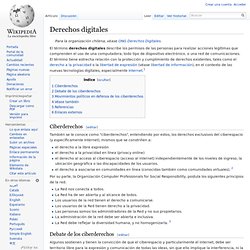
El término tiene estrecha relación con la protección y cumplimiento de derechos existentes, tales como el derecho a la privacidad o la libertad de expresión (véase libertad de información), en el contexto de las nuevas tecnologías digitales, especialmente Internet.[1] Ciberderechos[editar] Derecho a la privacidad. Derecho a la privacidad Todo el mundo tiene derecho a la privacidad, y según los mecanismos sobre derechos humanos internacionales, este derecho puede ser violado de diversas maneras, que incluyen: intervenir en la vida privada de una persona (lo que incluye su derecho a establecer relaciones y a disfrutar de su libertad sexual); impedir la vida familiar (lo que incluye el derecho a casarse y a fundar una familia); destruir la casa de una persona, o impedir a una persona que viva en su casa; intervenir la correspondencia privada.
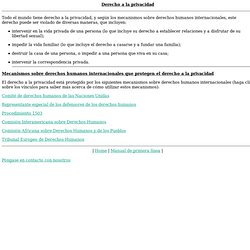
Mecanismos sobre derechos humanos internacionales que protegen el derecho a la privacidad El derecho a la privacidad está protegido por los siguientes mecanismos sobre derechos humanos internacionales (haga clic sobre los vínculos para saber más acerca de cómo utilizar estos mecanismos): Privacidad en Internet. La privacidad en Internet se refiere al control de la información que posee un determinado usuario que se conecta a Internet, interactuando por medio de diversos servicios en linea con los que intercambia datos durante la navegación.
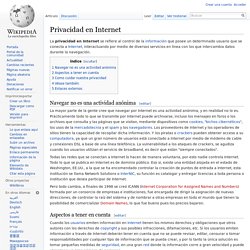
[editar] Todas las redes que se conectan a Internet lo hacen de manera voluntaria, por esto nadie controla Internet. Tracking Censorship through Copyright Proposals Worldwide. Deeplinks. Free Speech is Only As Strong As the Weakest Link. Online speech must travel through several "upstream" providers before reaching its audience.
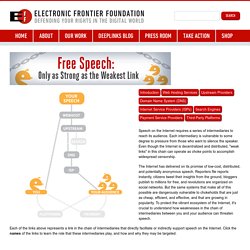
Each of these links in the chain may itself rely on its own upstream providers -- for example, smaller ISPs may simply connect users to larger ISPs, or hosting platforms may host their services on servers leased from a commercial datacenter. When at first they don’t succeed, censors try again upstream. The Internet’s strength lies partially in the fact that no single entity provides all the services necessary for the network to operate. The downside of this decentralization is that there are multiple intermediary points between any two users at which a third party may attempt to cut off speech. Action Center. Ways You Can Help EFF. In the Battles of SOPA and PIPA, Who Should Control the Internet? Two years earlier, Thackeray had helped the U.S.

Secret Service run Operation Sun Devil, one of the first crackdowns on illegal computer hacking. A lot of hackers hated Thackeray, and Dead Addict was not surprised when she responded to his invitation with the words “No. I wouldn’t go to a convention of car thieves, either.” Hackers are nothing if not persistent, and Thackeray was eventually persuaded to spend a few days in the kiln that is Vegas in July. An Open Internet Is Essential to a Free Internet: Why Net Neutrality Should Matter To Everyone. Right now the FCC is considering a set of rules that would allow Internet providers to offer faster access to some websites that can afford to pay.
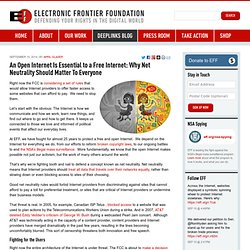
Net Neutrality. On Jan. 14, 2014, a federal court of appeals struck down the Federal Communications Commission’s Open Internet Order, which was designed to prevent Internet service providers from blocking or slowing users’ connections to online content.
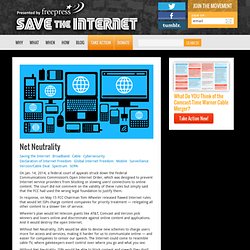
The court did not comment on the validity of these rules but simply said that the FCC had used the wrong legal foundation to justify them. In response, on May 15 FCC Chairman Tom Wheeler released flawed Internet rules that would let ISPs charge content companies for priority treatment — relegating all other content to a slower tier of service. Wheeler’s plan would let telecom giants like AT&T, Comcast and Verizon pick winners and losers online and discriminate against online content and applications. And it would destroy the open Internet. Without Net Neutrality, ISPs would be able to devise new schemes to charge users more for access and services, making it harder for us to communicate online — and easier for companies to censor our speech. The Internet Defense League - Protecting the Free Internet since 2012. Re:publica 2012: libertad y vigilancia, tecnología y futuro. Freedom of thought requires free media and free media requires free technology.
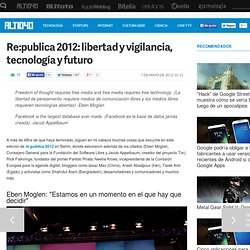
(La libertad de pensamiento requiere medios de comunicación libres y los medios libres requieren tecnologías abiertas) -Eben MoglanFacebook is the largest database ever made. (Facebook es la base de datos jamás creada) -Jacob Appelbaum. Declaration on the Future of Internet Cooperation. Representatives of the organizations that manage the technical infrastructure of the Internet meeting in Montevideo, Uruguay, have released a Declaration on the future of Internet cooperation [es], in which they analyze the problems currently affecting the future of the Internet.
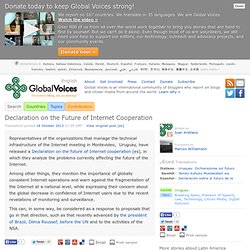
¿Quién gestiona Internet? Tecnopolítica, ¿para qué? líneas de fuga desde la Fundación Casa del Bosque. Pensar el mundo en el que habitamos, sin abordarle críticamente desde la tecnología, es tal vez, uno de los errores heredados de mayor trascendencia a la hora de pensar la libertad y el futuro desde los territorios del sur Pensar el sur y la tecnología, siempre abre un panorama signado por grandes contradicciones: el sur como escenario de extracción de materias primas, el sur como el centro desde el cual se canalizan parte importante de los medios materiales con los cuales se nutren los poderes que hoy gobiernan asimétricamente el planeta.
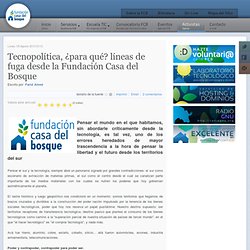
El lastre histórico y luego geopolítico nos condicionó en un momento: somos territorios que llegamos de brazos cruzados y divididos a la construcción del poder nación impulsado por la tenencia de los bienes sociales tecnológicos, poder que hoy nos reserva un papel pusilánime. Acá fue hierro, aluminio, cobre, estaño, cobalto, silicio... allá fueron automóviles, aviones, industria armamentista, telecomunicaciones. El derecho a ser vigilados. Via @fcbosque Colombia. Parece cosa de la ficción pero vivimos esos tiempos ahora mismo; y no por las batallas épicas, o las causas nobles de devolver la paz y la justicia a la tierra, no. Vivimos esos tiempos porque no es necesario ponernos el anillo, solo debemos hacer “click” en nuestras búsquedas o transferencias de información digital para ser rastreados, detectados y hasta perseguidos por un “gran ojo”, menos irreal que el de Tolkien y mucho más cercano de lo que podríamos imaginar.
Colombia en los últimos 10 años no ha escapado al avance de las nuevas tecnologías de información y comunicación NTIC y a su irrupción monumental sobre la vida cotidiana de todos los ciudadanos; esto no es nuevo; lo que sí es nuevo es de qué manera se han orquestado acciones legales e ilegales para justificar como un derecho, la vigilancia extrema sobre la vida y obra de todos y todas.
Es allí donde la realidad y la ficción se acercan, no hay un “gran ojo” mágico, pero hay espionaje digital y análogo. Zona Legal Artículo 17. Criptopunks. Libertad y Futuro de Internet. La EFF en Bogotá. #Political change: what #socialmedia can- and can't do #OTAN. #Socialmedia: can it hurt #Democracy too? #OTAN.
Freedom on the Net 2013. Despite Pushback, Internet Freedom Deteriorates. Freedom on the Net 2013 - A Global Assessment of Internet and Digital Media - Freedom House. Otra desvergüenza de Freedom House. ¿El derecho al olvido inspirará a los regímenes represivos a expandir la censura en Internet? La versión original de este post apareció en el blog IGMENA. El “derecho al olvido” de la Unión Europea ha dejado a muchos activistas en la región árabe con temor de que los gobiernos aprovechen la ley para limitar aún más las libertades de expresión y de información en Internet.
Ben Ali reunido con George W. Bush en Washington, DC, 2004. Fotografía por Paul Morse, liberada al dominio público. "Si una empresa controla tu acceso a Internet, controla tu vida" El inventor de la Red, el británico Tim Berners-Lee, advirtió este sábado en el festival Web We Want (la Red que queremos), celebrado en Londres, la amenaza que suponen para la privacidad en Internet los Gobiernos y las empresas interesadas en controlar la Web, informa AFP.
Desde hace algún tiempo, este científico informático viene pidiendo una declaración de derechos que garantice la independencia de Internet y la privacidad de los usuarios. Que una empresa pueda controlar nuestro acceso a Internet y las páginas web que visitamos significa que esta tiene un gran control sobre nuestras vidas "Que una empresa pueda controlar nuestro acceso a Internet y las páginas web que visitamos significa que esta tiene un gran control sobre nuestras vidas", afirmó Tim Berners-Lee en este consorcio londinense. Los Gobiernos asfixian la libertad en Internet, según un nuevo informe. De acuerdo con el informe, publicado por la ONG Freedom House, 34 de los 60 países analizados han sufrido una caída de las libertades en Internet en el último año. Irán, Cuba, China y Siria fueron clasificados como los países con mayores restricciones, mientras que Islandia, Estonia y Alemania ocuparon el podio en el 'ranking' de las libertades en línea, seguidos por EE.UU.
A pesar de todo, EE.UU. fue criticado en el informe a causa del "preocupante declive" de las libertades en Internet observado en el país, en gran parte como resultado del espionaje masivo realizado por los servicios secretos de EE.UU. y revelado por el excontratista de la CIA Edward Snowden. "Los críticos han expresado su preocupación por la posibilidad de que los programas secretos de la NSA violen la cuarta enmienda de la Constitución de EE.UU. (que protege a las personas dentro de EE.UU. Anton Nossik on the Coming End of Facebook, Twitter, and Google in Russia. A Russian apocalypse might be headed for social networks like Facebook, Twitter, and Google. Images mixed by Kevin Rothrock. Severing Russia’s connection to American Internet giants looks increasingly likely. Earlier today, September 26, Russia’s Federal Service for Supervision of Communications, Information Technology, and Mass Media (Roskomnadzor) revealed it has formally demanded that Facebook, Twitter, and Google obey a new law requiring “organizers of information distribution” to store on Russian soil six-month meta data archives, making them accessible to Russian police.
Also, the Duma is poised to pass the final reading of amendments to another law that will require websites and certain apps to store all user data on servers located inside Russia by January 1, 2015, rather than September 2016, as the law originally planned. For months already, speculation that the Kremlin will cut off access to American online social media has been a regular feature of commentary about the RuNet. Internet en Cuba, una de las menos libres del mundo. Juan O. Tamayo el Nuevo Herald. Internet se vuelve "cada vez menos libre" - BBC Mundo. Internet en el 2014: desigual, censurado y mal de privacidad. Reflections on the 2013 Internet Governance Forum. The Internet Governance Forum (IGF) wrapped up last week and despite funding issues that put the Forum in jeopardy back in August, it was generally regarded to have been a success.
While this year’s theme was ‘Building Bridges – Enhancing Multi-Stakeholder Cooperation for Growth and Sustainable Development,’ much of the discussion revolved around surveillance, human rights, principles of multistakeholderism and the dynamics of “enhanced cooperation.” CDTers Emma Llanso and Matthew Shears participated in the BestBits civil society pre-event and the IGF, and share their thoughts below on their week in Bali. Maneuvering on Global Governance The National Security Agency surveillance revelations fueled much of the discussion at IGF – both directly and indirectly. It became clear during the course of the week that the details of the summit proposed by President Rousseff and Fadi Chehadé were fluid and largely yet to be determined.
State Surveillance and the NSA What’s next for the IGF? The Open Internet: A Case for Net Neutrality. The White House Gets It Right On Net Neutrality. Will the FCC? Over the past year, millions of Internet users have spoken out in defense of the open Internet. Today, we know the White House heard us. In a statement issued this morning, President Barack Obama has called on the Federal Communications Commission to develop new “net neutrality” rules and, equally importantly, establish the legal authority it needs to support those rules by reclassifying broadband service as a “telecommunications service.”
This is very welcomed news. Back in May, the Federal Communications Commission proposed flawed “net neutrality” rules that would effectively bless the creation of Internet “slow lanes.” After months of netroots protests, we learned the FCC began to settle on a “hybrid” proposal that, we fear, is legally unsustainable. Here's why: if the FCC is going to craft and enforce clear and limited neutrality rules, it must first do one important thing. Today’s statement stresses a few key principles: No blocking. Net Neutrality: President Obama's Plan for a Free and Open Internet. The net neutrality debate and underlying dynamics: Research perspectives Journalist's Resource: Research for Reporting, from Harvard Shorenstein Center. (Wikimedia) On Nov. 10, 2014, after a long period of internal White House deliberation, President Obama announced a new plan to preserve “net neutrality” and to prevent Internet service providers from blocking or slowing websites or creating different tiers of speed.
“No service should be stuck in a ‘slow lane’ because it does not pay a fee,” he wrote in a statement. “That kind of gatekeeping would undermine the level playing field essential to the Internet’s growth.” Industry groups have already raised objections, and the debate is sure to play out for many months to come as the Federal Communications Commission (FCC) contemplates new rules.
The idea that the Internet should be operated like a public “road” — carrying all traffic, with no discrimination against any traveler, no matter what size, shape or type — seems to many a bedrock principle. Descarga el informe “Libertad de expresión en Internet” La Relatoría Especial para la Libertad de Expresión de la Comisión Interamericana de Derechos Humanos, presentó hace poco una versión actualizada de su informe Libertad de Expresión e Internet, el cual se encuentra disponible para todos en la web. De acuerdo con la organización, en el documento se explican los principios que deben servir de guía para la protección del derecho a la libertad de pensamiento y expresión en el entorno digital. Se describe un sistema de estándares en la materia y se analizan la práctica, la jurisprudencia y la doctrina internacional relevante. Se espera que este recurso sea útil para los activistas de Internet, las organizaciones sociales, los operadores jurídicos y reguladores que deben defender los derechos humanos en el ámbito digital.
Descarga el ebook desde aquí. Libertad de Expresión e Internet. Conclusiones Conferencia Internacional “Derechos Humanos en la Era Digital” El pasado 25 de julio de 2013, se llevó a cabo en Bogotá la conferencia Internacional “Derechos Humanos en la Era Digital”. El siguiente es el texto de conclusiones, que esperamos sea un documento de consulta para quienes asistieron presencial o virtualmente y para aquellos interesados en este tema. Disfruten la lectura y compartan con nosotros sus propias conclusiones. Por Amalia Toledo. Balancing Profits and Human Rights: How ICT Companies Can Lift Their Game.
This week EFF attended a meeting of the Human Rights Working Group of the Global e-Sustainability Initiative (GeSI), a global industry forum that includes many of the world's largest IT and communications companies, including AT&T, BlackBerry, HP, Microsoft, Telefónica, Verizon, and Vodafone. Responding to both global and regional calls for industry to share more responsibility for the human rights impacts of ICT products and services, GeSI's human rights project aims to enliven greater vigilance amongst its members as to the human rights impacts of their activities throughout the supply chain. GeSI members themselves are the best evidence of the need for this project. The most proximate example is given by the meeting's host AT&T, which a few days before the meeting announced that it had ceased to secretly track its mobile Internet users with unblockable super cookies.
Censura internet latinoamerica - Buscar con Google.
Organizaciones. Acktlvlsm. Lnternet_Securlty_Prlvacy. Ciberciudadanos_Netizens. Libertad para destruir o libertad para construir. Como queremos pasar a la historia.